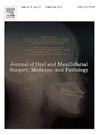桧木醇通过诱导细胞凋亡和抑制细胞迁移,在人口腔鳞状细胞癌中显示出强大的抗癌作用
IF 0.4
Q4 DENTISTRY, ORAL SURGERY & MEDICINE
Journal of Oral and Maxillofacial Surgery Medicine and Pathology
Pub Date : 2025-03-07
DOI:10.1016/j.ajoms.2025.02.019
引用次数: 0
摘要
目的研究表明,扁桃木醇(HNK)对多种疾病具有抗炎、抗菌等多种药理作用。然而,它对口腔癌的影响还没有报道。因此,我们研究了HNK在口腔鳞状细胞癌(OSCC)中的抗癌活性及其作用机制。方法采用MTT法检测细胞活力,DAPI染色、TUNEL染色、膜联蛋白V/碘化丙啶(PI)染色、流式细胞术检测细胞凋亡。使用伤口愈合试验评估细胞迁移能力。结果HNK抑制HSC-2细胞增殖呈剂量依赖性。此外,我们的评估显示HNK通过诱导细胞凋亡发挥其抗癌作用。此外,HNK以剂量依赖性的方式抑制HSC-2细胞的迁移。结论HNK具有作为治疗OSCC的重要先导化合物的潜力。此外,HNK通过诱导细胞凋亡和抑制细胞迁移来抑制OSCC。本文章由计算机程序翻译,如有差异,请以英文原文为准。
Hinokitiol exhibits potent anticancer effects in human oral squamous cell carcinoma by inducing apoptosis and inhibition of cell migration
Objective
Hinokitiol (HNK) has been shown to have various pharmacological effects, including anti-inflammatory and anti-bacterial activities, against various diseases. However, its effects on oral cancer have not been reported. Therefore, we investigated the anti-cancer activity and mechanism of action of HNK in oral squamous cell carcinoma (OSCC).
Methods
Cell viability was measured using the MTT assay, while apoptosis was assessed through DAPI staining, TUNEL assay, annexin V/propidium iodide (PI) staining, and flow cytometry. Cell migration capacity was evaluated using a wound-healing assay.
Results
Our findings indicate that HNK inhibits the proliferation of HSC-2 cells in a dose-dependent manner. Additionally, our evaluation revealed that HNK exerts its anticancer effects by inducing apoptosis. Moreover, HNK inhibited the migration of HSC-2 cells in a dose-dependent manner.
Conclusions
Based on our results, we conclude that HNK has the potential as an important lead compound in treating OSCC. Moreover, HNK inhibits OSCC by inducing apoptosis and suppressing cell migration.
求助全文
通过发布文献求助,成功后即可免费获取论文全文。
去求助
来源期刊

Journal of Oral and Maxillofacial Surgery Medicine and Pathology
DENTISTRY, ORAL SURGERY & MEDICINE-
CiteScore
0.80
自引率
0.00%
发文量
129
审稿时长
83 days
 求助内容:
求助内容: 应助结果提醒方式:
应助结果提醒方式:


